
Odonata is an order of predatory flying insects that includes the dragonflies and damselflies. The two groups are distinguished with dragonflies usually being bulkier with large compound eyes together and wings spread up or out at rest, while damselflies are usually more slender with eyes placed apart and wings folded together along body at rest. Adult odonates can land and perch, but rarely walk.
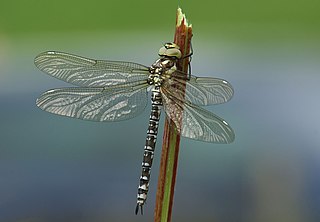
Aeshna, or the mosaic darners, is a genus of dragonflies from the family Aeshnidae. Species within this genus are generally known as "hawkers" or "darners".

The giant Hawaiian darner, also known as the giant Hawaiian dragonfly or pinao, is a species of dragonfly in the family Aeshnidae. It is one of two species of dragonfly that is endemic to the Hawaiian Islands. It is found near streams and wetlands on all islands of the archipelago and it has a wide altitude range, but is particularly common at higher elevations.

Somatochlora, or the striped emeralds, is a genus of dragonflies in the family Corduliidae with 42 described species found across the Northern Hemisphere.

Uropetala carovei is a giant dragonfly of the family Petaluridae, endemic to New Zealand. Its Māori name, kapokapowai means "water snatcher", alluding to the water dwelling juvenile stage (nymph), which, like all dragonflies, has a long extendable jaw that shoots out to snatch prey. It is also known as Carové's Giant Dragonfly.
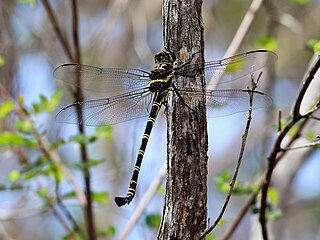
Petalura ingentissima, the giant petaltail, has been described as the world's largest dragonfly, with a wingspan of 160 mm. It is found in Queensland, Australia.

Ictinogomphus is a genus of dragonflies in either the family Gomphidae or Lindeniidae. They are medium to large, yellow and black with clear wings. Species occur in Africa, Asia and Australia.
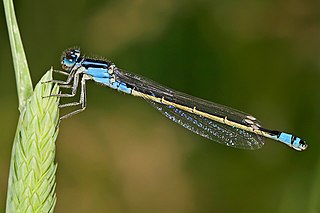
Ischnura is a genus of damselflies known as forktails in the family Coenagrionidae. Forktails are distributed worldwide, including various oceanic islands. The males have a forked projection at the tip of the abdomen which gives the group their common name.

Lestes is a genus of damselfly in the family Lestidae. The family hold their wings at about 45 degrees to the body when resting. This distinguishes them from most other species of damselflies which hold the wings along, and parallel to, the body when at rest.
Oligoaeschna is a genus of dragonfly in the family Aeshnidae. It contains the following species:

Petalura is a genus of very large dragonflies in the family Petaluridae. Species of Petalura are brown or black with yellow markings and usually clear wings. The anal appendages of the males are broad and leaf-like giving them their common name of petaltails. They are endemic to south-western and eastern Australia.

Rhyothemis is a genus of dragonfly in the family Libellulidae. They are commonly known as flutterers.
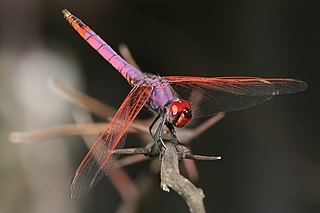
Trithemis is a genus of dragonflies in the family Libellulidae. They are commonly known as dropwings. There are over 40 species, mainly from Africa; two are endemic to Madagascar, and five can be found in Asia. They are found in a wide variety of habitats; some species being adapted to permanent streams in forests, and others being capable of breeding in temporary pools in deserts.
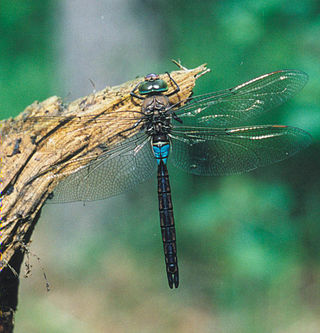
Anax is a genus of dragonflies in the family Aeshnidae. It includes species such as the emperor dragonfly, Anax imperator.
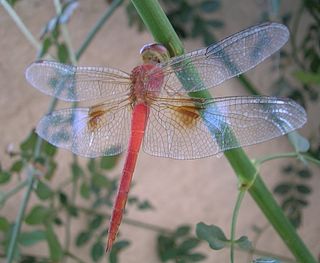
Tholymis is a genus of medium-sized dragonflies in the family Libellulidae. Species of Tholymis are tropical, active mostly at dawn and dusk.

Austrophlebia is a small genus of dragonflies in the family Telephlebiidae. Species of this dragonfly are very large with strong yellow markings on the thorax. They are endemic to eastern Australia.
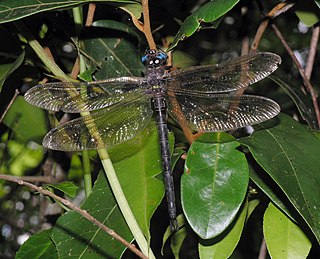
Tetracanthagyna is an Asian genus of dragonflies in the family Aeshnidae.

Lestoidea is a genus of damselflies in the family Lestoideidae, commonly known as bluestreaks. Its species are endemic to north-east Queensland, Australia, where they inhabit rainforest streams.

The giant hawker or the gigantic riverhawker, is a species of dragonfly in the family Aeshnidae. It is found throughout Sundaland, having been recorded on Thailand, Peninsular Malaysia, Singapore, Sumatra, and Borneo. It is the type species for the genus Tetracanthagyna.



















